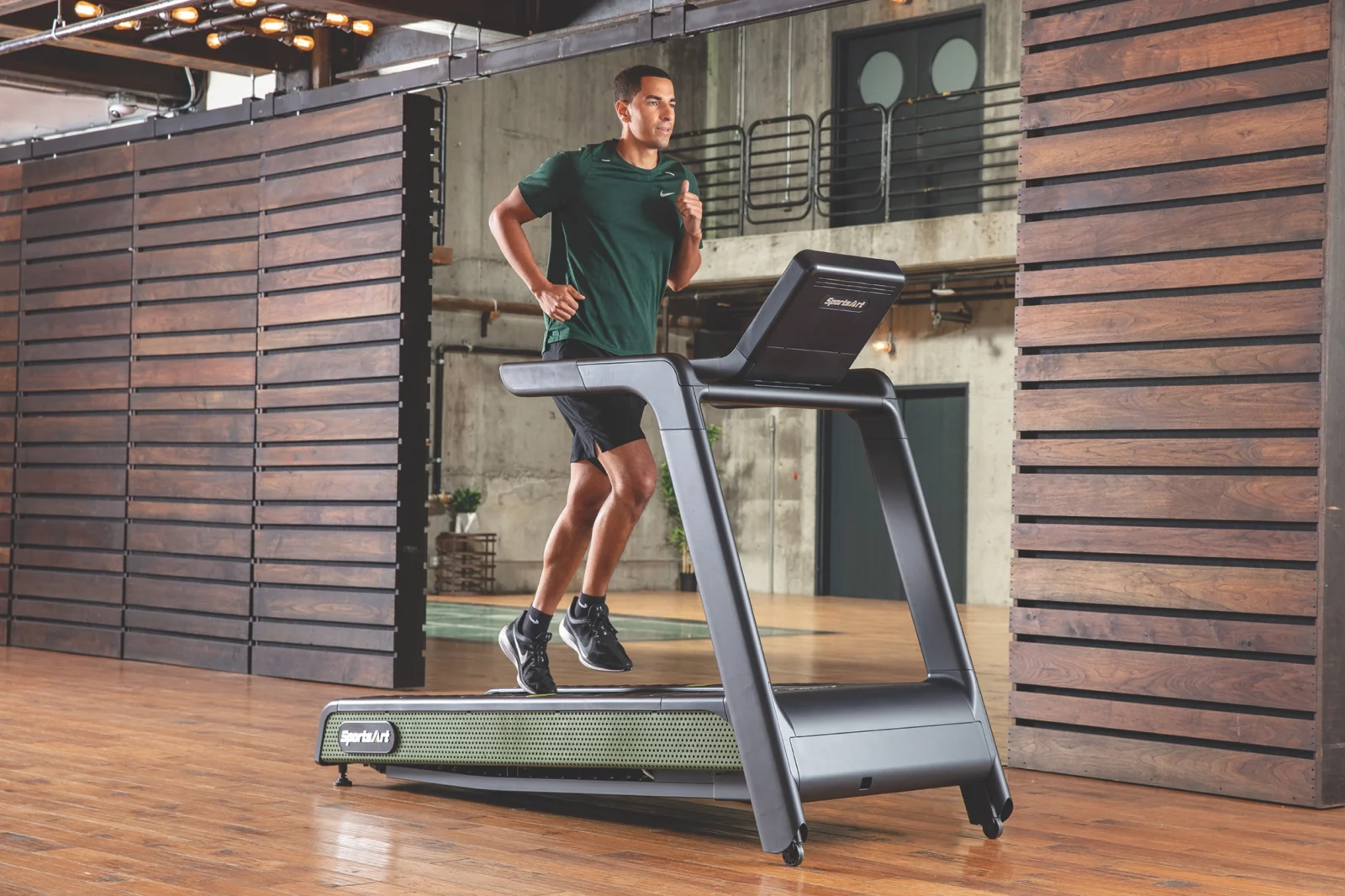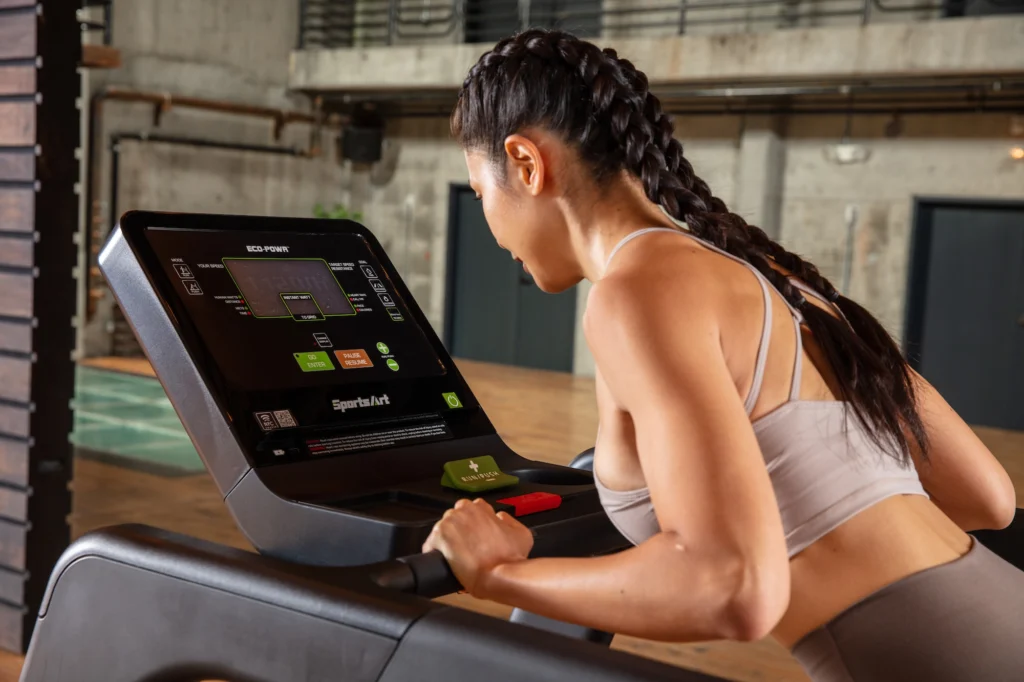For SportsArt, Sustainability Is a Core Value and Key Selling Point

The maker of the world’s first carbon-negative treadmill is well-positioned to capitalize on the growing demand for sustainable fitness products
When SportsArt got started nearly fifty years ago, “sustainability” wasn’t in fashion, nor was it a marketing buzzword making headlines in the news.
Paul Kuo founded the company that would become SportsArt in 1977 with the idea of making fitness equipment smarter, better and more sustainable.
“I’m a little biased, but you can basically call Paul Kuo a saint,” Ruben Mejia, SportsArt’s executive vice president for the Americas, told Athletech News. “He’s thought about the environment since before we were around, and it’s always been one of his core principles.”
Today, the company Kuo created is in a league of its own when it comes to creating sustainable fitness equipment.
SportsArt’s non-motorized treadmill known as the G660 recently had its carbon footprint certified by the British Standards Institution.
According to SportsArt, based the average amount of clean energy the G660 generates per day in a typical commercial gym, it will become carbon negative after five years of use. The company says the G660 has at least a seven-year life cycle, meaning it would be making a net positive impact on the environment for those remaining two years and potentially beyond.
That makes the G660 the “first carbon negative piece of fitness equipment on the market,” SportsArt says, marking a significant milestone for the company on its decades-long sustainability journey.
“There’s nothing else like this,” Mejia said of the G660 as well as its non-motorized older sibling, the larger G690. “There’s no motor, your power is actually moving the belt and you’re generating electricity.”

It’s a long and complex process to receive certification, so SportsArt is taking things one machine at a time. The G660 was the first product the company sent out for certification. After the initial success, Mejia said he expects the G690 and other pieces of equipment from SportsArt’s ECO-POWR™ line, the company’s group of fitness machines that rely on human-generated power, to soon have their own carbon footprints certified.
Non-motorized treadmills are just one part of SportsArt’s larger sustainability story. The company produces many types of gym equipment with a focus on sustainability, ranging from treadmills to rowers to strength training machines.
SportsArt sells its equipment to operators of all types, including gyms, universities, corporate clients and even local municipalities.
“We’ve had universities, we’ve had huge hotel groups,” Mejia said of the company’s client list. “We’ve had things as small as a City Hall that wants to have some sort of sustainability message inside their building. So there’s not really a category. It’s people that care about the environment, and people that want to align with a brand that shares the same values as them.”
Mejia says that currently, universities and corporations are the biggest buyers of SportsArt’s equipment, since students and employees increasingly demand eco-friendly options for working out.
Gym and studio owners are getting on board with sustainability too, albeit a little more slowly.
“We’re starting to see a bit more of an uptick in gyms wanting to have an additional (sustainability) message,” Mejia said.
“It’s kind of hard to convince someone to move away from something that they’re used to, Mejia said of some gym owners’ reticence to embrace sustainable equipment. “But when you start to look at all the data points, like how Gen Z and Millennials align themselves more with brands that align with their values, and are willing to pay a little bit more for a company that has a higher purpose, then they start believing that data and start to look at things a bit differently.”
According to a recent study from First Insight, three-quarters of Gen Z consumers state that sustainability is more important to them than brand names. Three-quarters of Millennials, meanwhile, would change their buying habits to favor environmentally friendly products, per Nielsen.
“What we’ve been telling people is, ‘These changes are coming, whether you believe in the concept or not,'” Mejia says of sustainability. “There are a lot of people that do believe, and that demand is going to start to grow.”
Buying sustainable equipment can also be financially beneficial for gym owners in the short and long term.
Mejia noted that SportsArt has clients in multiple states who’ve received rebates from electricity companies for reducing their energy expenditures thanks in part to the company’s equipment. And some of SportsArt’s machines are designed to last as long as 15 years, meaning gym owners could save money by not having to buy replacement options as soon as they would with traditional manufacturers.
Mejia was quick to point out that sustainability isn’t SportsArt’s only selling point. The company offers a wide range of products, including its ICARE elliptical device. The result of a partnership with the Madonna Rehabilitation Hospital and Research Institute in Lincoln, Nebraska, the ICARE mimics peoples’ natural walking patterns and has been used by the hospital to help patients recovering from a stroke or battling diseases like cerebral palsy gain important muscle activation that’s usually only possible through the act of walking itself.
“We’re not a one-trick pony,” Mejia said. “We have strength equipment, rehabilitation equipment and normal, regular cardio machines. We have entertainment and touch screens, so we offer quite a lot.”
Still, sustainability is one of SportsArt’s core values and chief selling points.
Mejia believes the company is uniquely positioned to capitalize on the growing demand for sustainability in fitness, whether that demand is driven by climate change-related legislation or consumers’ shifting preferences.
“I think that the consumer is going to drive the change,” Mejia said, bringing up the example of eco-conscious college students submitting proposals to universities to obtain grant money to purchase sustainable gym equipment.
“I know that once those folks get into the working world and start becoming decision makers, they’re going to remember SportsArt because we were the only ones that had this equipment and technology, and they’re going to demand that their gyms and their companies live more sustainably.”
Correction: An earlier version of this article mischaracterized the certification obtained by the SportsArt G660 treadmill. The BSI didn’t certify the device as carbon-negative, it certified the machine’s carbon footprint.



